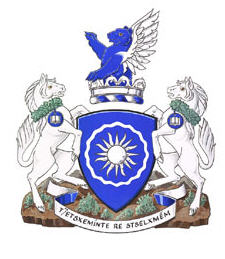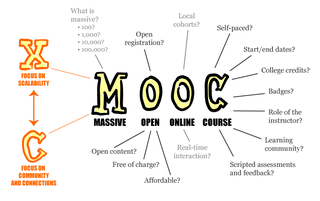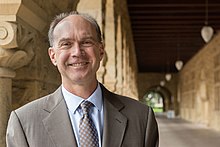
The University of Manitoba is a public research university in Winnipeg City, Manitoba Province, Canada. Founded in 1877, it is the first university of Western Canada. Both by total student enrolment and campus area, the University of Manitoba is the largest university in the province of Manitoba. Its main campus is located in the Fort Garry neighbourhood of Winnipeg, with other campuses throughout the city: the Bannatyne Campus, the James W. Burns Executive Education Centre, the William Norrie Centre, and the French-language affiliate, Université de Saint-Boniface in the Saint Boniface ward.
The Graduate School and University Center of the City University of New York is a public research institution and postgraduate university in New York City. Serving as the principal doctorate-granting institution of the City University of New York (CUNY) system, The CUNY Graduate Center is classified among "R1: Doctoral Universities – Very High Research Activity". The school is located at the B. Altman and Company Building at 365 Fifth Avenue in Midtown Manhattan. The CUNY Graduate Center has 4,600 students, 31 doctoral programs, 14 master's programs, and 30 research centers and institutes. It employs a core faculty of approximately 140, who are supplemented by 1,800 faculty members from CUNY's eleven senior colleges and New York City's cultural and scientific institutions.

The Department of Computer Science and Technology, formerly the Computer Laboratory, is the computer science department of the University of Cambridge. As of 2023 it employed 56 faculty members, 45 support staff, 105 research staff, and about 205 research students. The current Head of Department is Professor Alastair Beresford.
The Open University of Israel is a distance-education university in Israel. It is one of ten public universities in Israel recognized by the Council of Higher Education (CHE). The Open University is unique in that it does not require a matriculation certificate, psychometric exam, or other entrance exam for admission to undergraduate studies.

The University of Alabama in Huntsville (UAH) is a public research university in Huntsville, Alabama. The university is accredited by the Southern Association of Colleges and Schools and comprises eight colleges: arts, humanities & social sciences; business; education; engineering; honors; nursing; science; and graduate. The university's enrollment is approximately 10,000. It is part of the University of Alabama System and is classified among "R1: Doctoral Universities: Very High Research Activity".

Thompson Rivers University is a public teaching and research university offering undergraduate and graduate degrees and vocational training. Its main campus is in Kamloops, British Columbia, Canada, and its name comes from the two rivers which converge in Kamloops, the North Thompson and South Thompson. The university has a satellite campus in Williams Lake, BC and a distance education division called TRU-Open Learning. It also has several international partnerships through its TRU World division. TRU is accredited by the Northwest Commission on Colleges and Universities (NWCCU) at the associate, baccalaureate and master's degree levels.
Jeffrey David Ullman is an American computer scientist and the Stanford W. Ascherman Professor of Engineering, Emeritus, at Stanford University. His textbooks on compilers, theory of computation, data structures, and databases are regarded as standards in their fields. He and his long-time collaborator Alfred Aho are the recipients of the 2020 Turing Award, generally recognized as the highest distinction in computer science.

The University of the Philippines Open University(UPOU) is a public research university and is the fifth constituent university of the University of the Philippines System. The majority of UPOU students are based in the Philippines but all of its programs can be taken anywhere in the world. While primarily a virtual university, it has a physical campus that houses admin and faculty offices in Los Baños, Laguna, with Mega Learning Hubs (MLH) in Manila and Cebu.
Monica Sin-Ling Lam is an American computer scientist. She is a professor in the Computer Science Department at Stanford University.
The Stanford Learning Lab was an applied research organization that "carried out projects to improve the quality of teaching and learning in higher education through effective application of information technologies and the sciences of learning". It was created in 1997 on the recommendation of the Stanford University President's Commission on Technology in Teaching and Learning. Professors Larry Leifer and Larry Friedlander lead a staff of researchers, technologists, educators, and teaching and learning specialists who worked with Stanford faculty to enhance learning by students in their courses. The Stanford Learning Lab completed its work in the spring of 2002 and was followed by The Stanford Center for Innovations in Learning (SCIL), which inherited core capabilities in technology development, educational program evaluation, and learning design and continued to perform research in these areas.

Christoph Meinel is a German computer scientist and professor of Internet technologies and systems at the Hasso Plattner Institute (HPI) of the University of Potsdam. In the years 2004 to 2023 he was the scientific director and CEO of the HPI and has developed the openHPI learning platform with more than 1 million enrolled learners. In 2019, he was appointed to the New Internet IPv6 Hall of Fame.
OpenCourseWare (OCW) are course lessons created at universities and published for free via the Internet. OCW projects first appeared in the late 1990s, and after gaining traction in Europe and then the United States have become a worldwide means of delivering educational content.
Mobile-assisted language learning (MALL) is language learning that is assisted or enhanced through the use of a handheld mobile device.
Stanford University has many centers and institutes dedicated to the study of various specific topics. These centers and institutes may be within a department, within a school but across departments, an independent laboratory, institute or center reporting directly to the dean of research and outside any school, or semi-independent of the university itself.

A Virtual Learning Environment (VLE) is a system specifically designed to facilitate the management of educational courses by teachers for their students. It predominantly relies on computer hardware and software, enabling distance learning. In North America, this concept is commonly denoted as a "Learning Management System" (LMS).

Andrew Yan-Tak Ng is a British-American computer scientist and technology entrepreneur focusing on machine learning and artificial intelligence (AI). Ng was a cofounder and head of Google Brain and was the former Chief Scientist at Baidu, building the company's Artificial Intelligence Group into a team of several thousand people.
Andrew McCallum is a professor in the computer science department at University of Massachusetts Amherst. His primary specialties are in machine learning, natural language processing, information extraction, information integration, and social network analysis.

The Digital Writing and Research Lab (DWRL) is a research lab at The University of Texas at Austin, United States, dedicated to the identification and promotion of twenty-first-century literacies. These literacies range from navigating online newsfeeds and participating in social networking sites to composing multimedia texts that require producing, sampling, and/or remixing media content.

A massive open online course or an open online course is an online course aimed at unlimited participation and open access via the Web. In addition to traditional course materials, such as filmed lectures, readings, and problem sets, many MOOCs provide interactive courses with user forums or social media discussions to support community interactions among students, professors, and teaching assistants (TAs), as well as immediate feedback to quick quizzes and assignments. MOOCs are a widely researched development in distance education, first introduced in 2008, that emerged as a popular mode of learning in 2012, a year called the "Year of the MOOC".
Boon Thau Loo is a Singaporean-American computer scientist, college administrator, and technology entrepreneur. He is currently the RCA professor in the Computer and Information Science department at the University of Pennsylvania where he leads a research lab working on distributed systems, and serves as the Associate Dean for Graduate Programs at the University of Pennsylvania School of Engineering and Applied Science.










